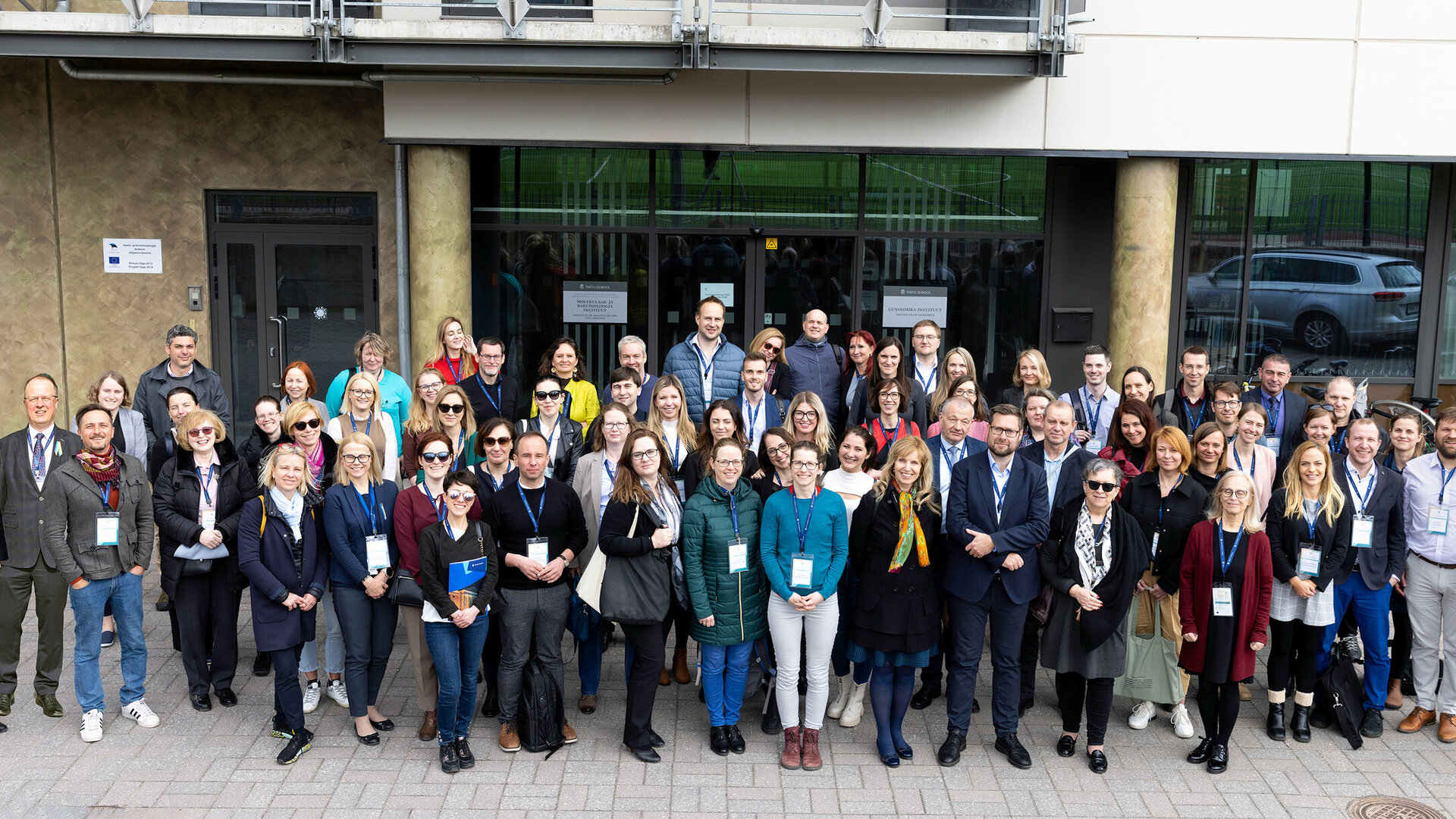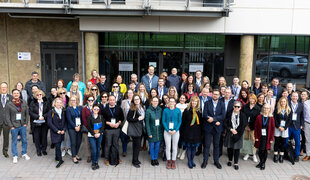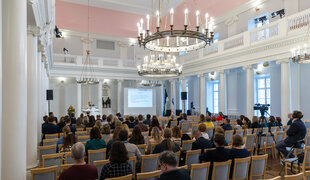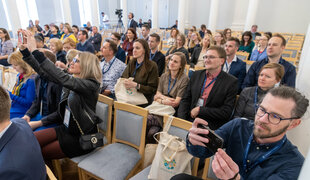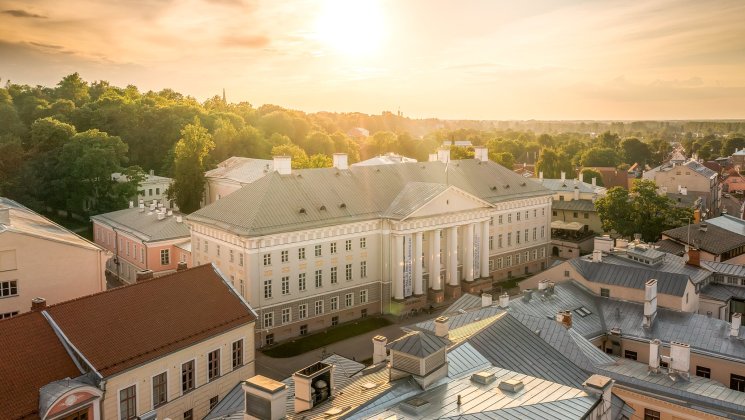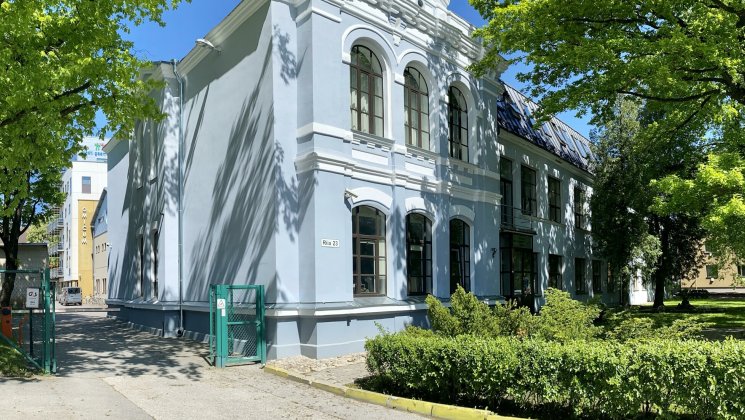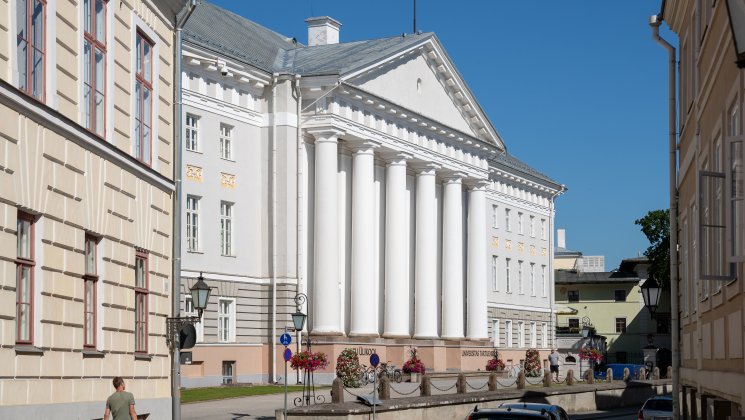The Alliance4Life members finally met in person in Estonia
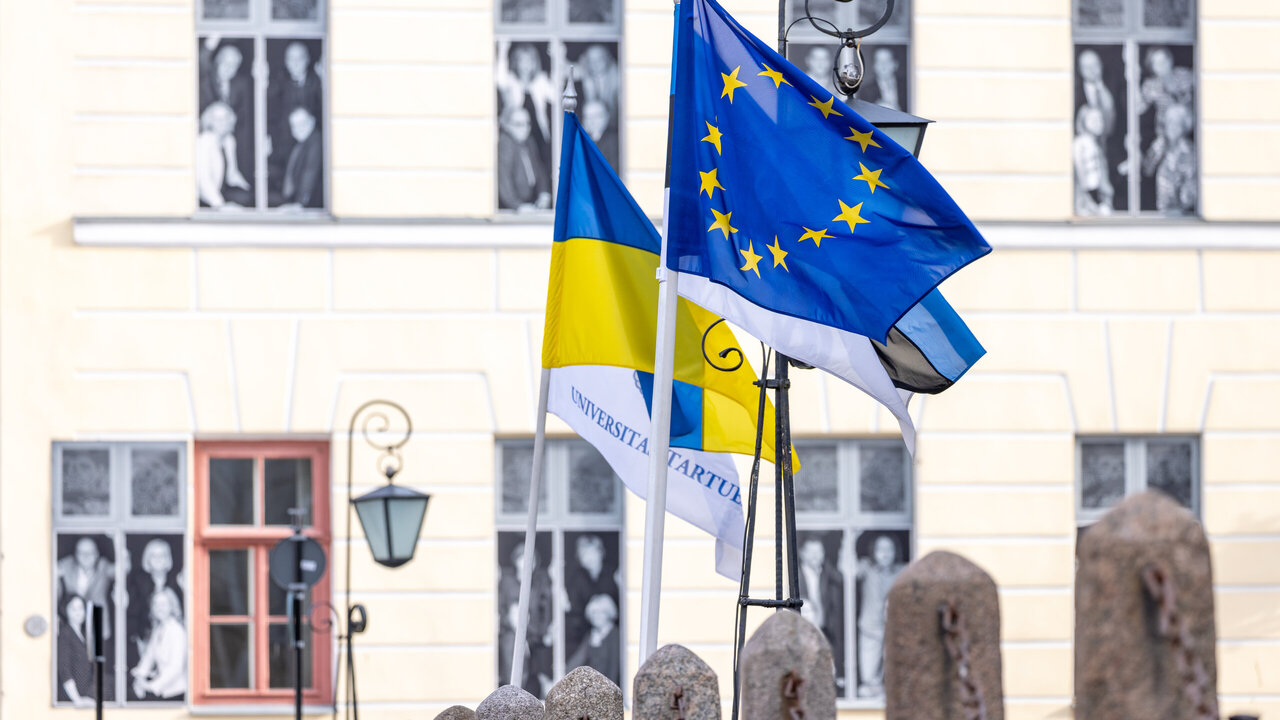
This long-awaited in-person Community Meeting followed a two and half years of online collaboration caused by the covid-19 pandemic. The Community Meeting and Skills Academy took place from 28th to 30th April and brought together 120 scientists and research managers from 12 countries in the intellectual capital of Estonia – Tartu.
Members, who were not able to travel to Estonia could attend the meeting online as this meeting was organised in a hybrid mode. This Community Meeting was a huge success as it managed to reawaken the team spirit.
Opening in the historical Aula of the University of Tartu
The event was opened by the rector of the University of Tartu (UT) Toomas Asser and by the host of the event and representative of UT on the Alliance4Life´s Board Toivo Maimets, professor of cell biology, from the Institute of Molecular and Cell Biology (UT), who warmly welcomed all participants in the beautiful historical Aula of the University of Tartu.
Estonian MP, professor of philosophy at UT, Margit Sutrop, who is also the director of the UTARTU Ethics Centre shared the Estonian experience towards greater research integrity. She emphasized the importance of research ethics in scientific research as it signifies the credibility of researchers in the community and also helps to avoid scientific misconduct.
Silvia Bottaro who is a legal officer at the Open Science Unit of the European Commission (EC), DG Research and Innovation, introduced the main priorities of the Pact for R&I. The Pact focuses on Open Science including citizen science, careers in research, and research assessment and reward system. She presented the initiative called Coalition of Willing which prepares the research assessment reform in the EU. Alliance4Life is an assembly member of the Coalition of Willing. Silvia informed the audience about the current status of the agreement preparation, the main commitments it contains, and appreciated the work Alliance4Life has already delivered especially in the field of self-assessment and evaluation.
The formal part of the 1st day programme was concluded by a speech by the chair of the Alliance4Life and director of CEITEC Masaryk University (MU) Jiří Nantl, who summarized both the main achievements of the Alliance4Life during the last year and the highlights that shape its activities in 2022. His main message was that the New ERA should be based on leadership from the middle as successfully exemplified by the Alliance4Life, which is already now at the frontline of the New ERA developments.
The first day was concluded by a joint dinner in the University Café where many colleagues who have worked together for two years only over their computer screens finally met in person.
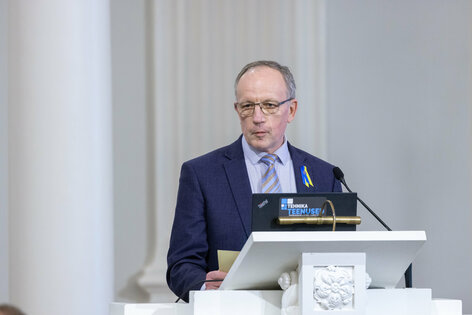
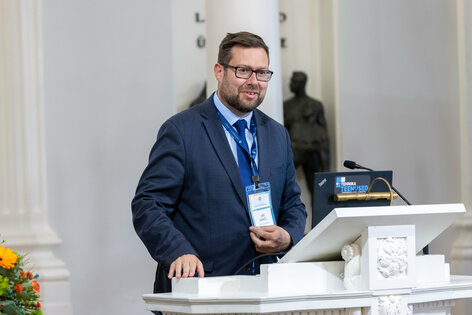
2nd Day Plenary
The second and third day sessions took place in the Institute of Molecular and Cell Biology, UTARTU.
The second-day plenary session was opened by Julia Fernández-Rodríguez, who is the president of the Core Technologies for Life Sciences (CTLS). Julia emphasized the importance of core facilities in excellent research and stressed that not the technology itself, but the “team science” based on a professional CF staff is the key. She explained not only what is a core facility and how it works, but mentioned also the role of CF in attracting young group leaders, as a meeting point and as an entry point for grants. She shared interesting information about the European School for RI management and its efforts in the development of CF professionals.
Simona Rataj, who is the head of the knowledge transfer office at the University of Ljubljana shared her experience with university and industry cooperation and its contribution to greater innovation potential. She explained that the main goal of knowledge valorisation is to increase the impact of research and mentioned evidence-based policies and social innovation as two new outcomes of research valorisation activity. She emphasized that the main asset of valorisation is not the money, but the network of professional intermediaries bridging the universities and the industry.
The session was closed by an enlightening talk by Kurt Deketelaere, who serves as secretary-general of the League of European Research Universities (LERU) and also as the WIDENING excellence ambassador of the Crowdhelix Network. Kurt introduced LERU and its group of seven Central and Eastern European universities (CE7), where also three members of Alliance4Life are represented, as well as the Crowdhelix Network activities, especially in the WIDENING policy field. He highlighted several concerns about the New ERA expectations, especially the necessity of a legal framework, political backing by the Member States and financial support.
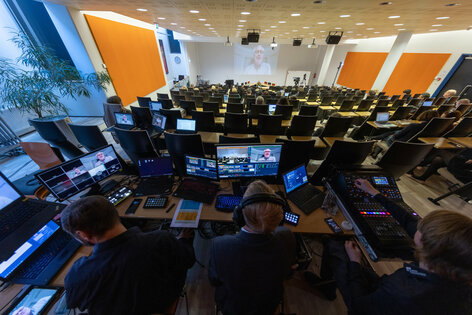
Meeting of the Alliance4Life´s Board
The meeting of the Board was opened by the Alliance4Life´s coordinator Zlatuše Novotná who provided an overview of the A4L_ACTIONS project work packages and their current status. Despite the pandemic, the team has managed to deliver all project deliverables and achieved all planned project milestones on time. Zlatuše invited all members to the upcoming RMA academy that will take place between 12th and 16th September 2022 in Bulgaria and to the scientific mini-conference that will take place between 3rd and 5th October 2022 in Slovakia. She summarized all deliverables planned for 2022 and introduced the recently published Call for Open Access to Alliance4Life core facilities that enables all scientists from partner institutions to access core facilities across all institutes free of charge or better said with the generous support of the European Union. The aim of the call is to promote regional scientific collaboration and access to state-of-the-art infrastructure that might be missing in some member countries.
Eliška Handlířová from CEITEC Masaryk University, who is the chair of focus group 3 (HR and Mobility) presented the results of the career systems mapping that provides detailed self-evaluation of career system practices present across the member institutions. This information provides a valuable starting point as there aren’t any internationally recognised human resource management and science career system models available that could be applied across the CEE countries. The self-evaluation mapping started with the identification of obstacles and providing inspiration from functioning systems and will now move to practical changes across the institutional career systems. She concluded that now the gravity of work in the HR area shall go back to the institutional level with the identification of priority areas for improvement at each member institution and implementation of concrete action plans.
Silvia Pastoreková, director of the Biomedical Research Centre of the Slovak Academy of Sciences (SAS) of who is leader of the work package 1 – Science for Excellence, introduced the task peer evaluation of research quality. Based on peer-assessment reports, all partners will design research management strategies with action plans detailing how this strategic feedback will be implemented into the institutional practice. The proposed actions will be subjected to bi-annual monitoring by the ISABs. Silvia invited all Allience4Life members to the Mini Conference event that will be held between 3rd and 5th October 2022 at the Smolenice Castle of the Slovak Academy of Sciences.
The second day included also the meetings of all focus groups (1-7).
Skills Academy
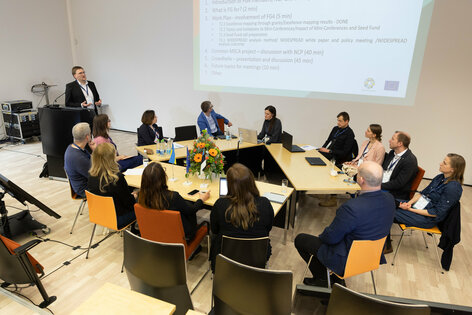
Researchers and research managers had a chance to further develop the soft and transferable skills that will help them to reach their goals within the complex research environment. The participants could select from four offered courses that focused this time on the development of research:
- training skills
- communication skills
- leadership skills
- intellectual property management
Damjana Kastelic from CRG Barcelona introduced the very important concept of leadership and coaching in science. Scientific careers are very complex, demanding, uncertain, and often accompanied by many rejections. At times, it can be challenging for research group leaders to maintain excellent scientific performance in such a complex environment, and to master interpersonal dynamics in their research teams. Coaching is one of the most powerful techniques by blending active listening, asking open-ended questions, setting SMART goals, and emotional intelligence by being fully present and focused. Damjana introduced concrete coaching tools and practices, that participants can apply in their research groups to improve interpersonal communication and to establish greater emotional safety for their lab members. Because only a safe environment, where new ideas and constructive feedback are supported, can foster innovation and growth.
Simona Rataj from the University of Ljubljana and her colleagues Katarina Šimunović and Nikolai Adamovitch delivered an online lecture about intellectual property management and how to bring scientific inventions from the laboratory to the market. Protection and exploitation of the intellectual property developed by researchers are as important as the publishing of scientific articles. But it has to be done properly and in the right order to keep as many options open as possible. The speakers shared with the audience how to identify and protect intellectual property, how to find partners for further development of the invention and what are the pitfalls of collaboration with the industry.
Ester Jarour from CEITEC Masaryk University delivered an interactive practical workshop on science communication and how to effectively present research results. Giving scientific presentations is an important part of sharing researchers’ work and achieving recognition in the larger scientific communities. The ability to do so effectively can greatly contribute to career success, regardless if PhD students choose to pursue an academic career or join the industry. However, instead of engaging audiences and conveying enthusiasm, many presentations include pitfalls such as overly complicated content, monotone delivery and focusing on what the speaker wants to say instead of satisfying the needs of the audience. The goal of this course was to teach early-stage researchers and research administrators how to prepare effective presentations that would appeal to a wide range of audiences.
Damjana Kastelic and Jonas Krebs from the CRG Barcelona introduced the future of research training using virtual reality. Virtual reality (VR) is one of the next big technological waves with innumerable applications in virtually every professional discipline. It will allow completely new ways of remote collaborations in far more engaging ways with far more possibilities than traditional video conferencing and online collaboration tools allow. VR, therefore, bears an unprecedented potential to reduce travel and production costs and thus contribute to a more sustainable way of working in the future. The trainers shed light on novel virtual tools that allow more immersive interactions between participants in networking, communication, research and training than traditional platforms. The focus was set on virtual reality (VR) assisted tools that also allow the integration of VR headsets.
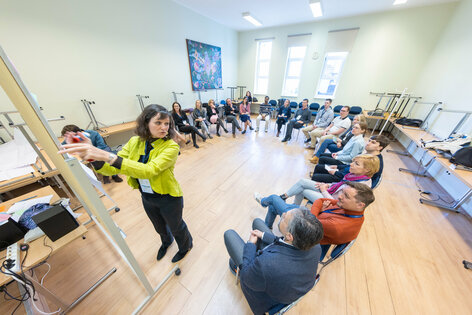
The evening ended with a dinner and some social games at HUMAL restaurant.
3rd Day Plenary
The third, half-day, plenary summarized the work. Allince4Life coordinator Zlatuše Novotná and all the heads of the focus groups gave an overview of the work done and next plans.
The participants thanked the organizer, University of Tartu, for excellent job. UTARTU was responsible for the organisation and programme of the Community Meeting. University of Ljubljana received, as responsible for the Skills Academy programme, aplause for good job. The technical support of the hybrid-conference service was appreciated highly. The partner here was Eesti Tehnikateenused OÜ.
The slides of the presentations and the recordings are available on the webpage of the project.
The task force team from UTARTU included (all Institute of Molecular and Cell Biology):
Toivo Maimets, professor
Teele Eensaar, project manager
Ermo Leuska, communication specialist
All recordings of the conference
Photos: University of Tartu, Andres Tennus
The news has been referred from the official news on the webpage of the Alliance, written by Ester Jarour.
The project “Alliance for Life Sciences: From Strategies to Actions in Central and Eastern Europe” received funding from the European Union’s Horizon 2020 research and innovation programme under grant agreement No. 964997.
The material reflects the view of Alliance4Life consortium and the European Commission is not responsible for any use that may be made of the information it contains.


